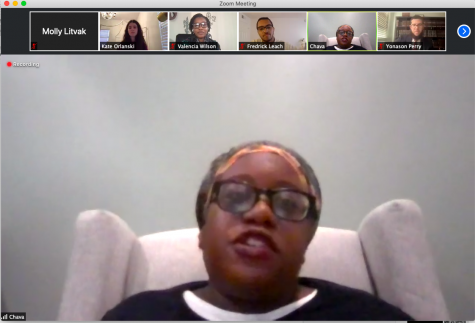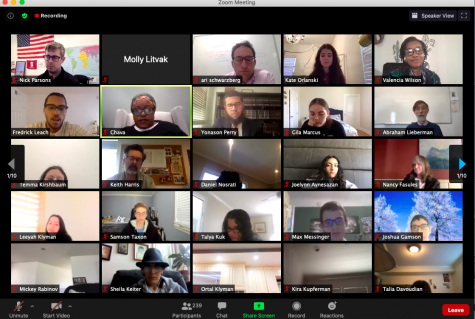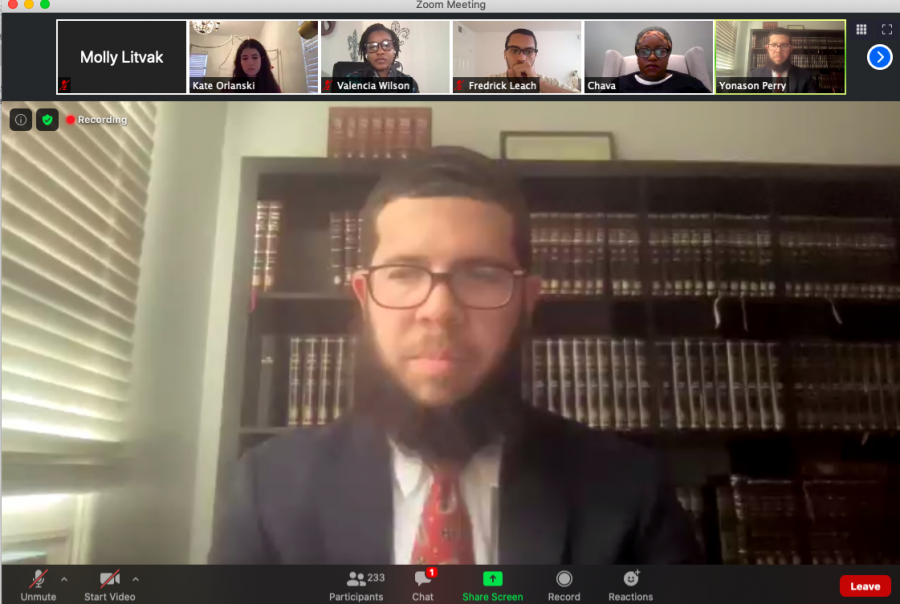BOTH: Rabbi Jonathan Perry of Chabad said it is a struggle to be seen as fully Jewish and fully Black. At top, from left, Town Hall was led by Agenda Chair Kate Orlanski, who interviewed Shalhevet teachers Ms. Valencia Wilson and Mr. Fred Leach, and Mrs. Chava Shervington of the Orthodox organization Kamochah.
Town Hall offers view of what it’s like to be Orthodox Jews who are Black
Shalhevet’s Black teachers share similar experiences of suspicion, fear and the burden of making others feel comfortable
March 16, 2021
Racism against Black Americans exists in the Jewish community too, according to four Black panelists — two of whom are Jewish — who spoke at Town Hall on Feb. 5 in honor of Black History Month.
Interviewed together during the schoolwide meeting on Zoom were Shalhevet faculty Mr. Fred Leach, Digital Firehawks Instructor, and Ms. Valencia Wilson, Educational Support Specialist; along with Rabbi Jonathan Perry, a Los Angeles-based rabbi of the Chabad Lubavitch movement; and Mrs. Chava Shervington, a co-founder of Kamochah, which educates the Orthodox community on racial justice and works to supports Orthodox Jews who are Black.
Over the course of the hour-long meeting, students heard and learned about an ostracism that often comes with being Jew who is Black, along with day-to-day instances of racism that according to the panelists can be much more hurtful and uncomfortable than they may seem.
Throughout Town Hall, the panelists described how racism is engraved in American culture; the importance of the George Floyd riots; and the more subtle yet present encounters of racism in Jewish communities.
“It’s the having people ask me my story at Shabbat meals constantly, or the frum stores not wanting to buzz you in,” said Mrs. Shervington, an attorney and mother who lives in Pico-Robertson.
“It’s the people who you ask ‘I want to buy a Shabbos robe’” — a modest maxi-dress some Orthodox women wear on Shabbat — “and they’re like ‘For your Easter, for your church,” she said. “It’s people pretending and bulldozing you like they don’t hear you and trying to force a non-Jewish identity on to you.”
All four discussed the experience of being Black in a Jewish community — Mrs. Shervington and Rabbi Perry through the lens of being Jewish themselves, and Ms. Wilson and Mr. Leach through the lens of working at a Jewish school.
Mrs. Shervington said that to her, being both Jewish and Black meant feeling like a part of the Jewish community while at the same time feeling slightly discounted.
Rabbi Perry gave an example of how Jews who are Black are treated differently in their communities.
“Black Jews in a Jewish space want to be just accepted as Jews, a million percent,” Rabbi Perry said. “[But] I know that when Black Jews start to organize, a lot of times non-Black Jews raise an eyebrow, or have something to say — even though every other ethnic background of Jewish people have their organizations and even their own shuls sometimes.”
The panelists also described microaggressions and instances of racism that may have not been intended but were still hurtful.
Mr. Leach explained how it might be challenging for Black people to not only encounter situations involving microaggressions — that is, instances of subtle or unintentional racism — but also to figure out how to handle them.
“As uncomfortable as it is [for non-Blacks] when you get called out for saying something that might be a microaggression, or saying something that’s a little problematic, it’s double-y awkward for us,” Mr. Leach said. “We not only have to deal with it, then we’re worried about are we going to be perceived as too radical.”
Ms. Wilson recalled a time where she brought her son to a Shalhevet basketball game and someone outside assumed she was only there because she was related to one of the student athletes who was Black as well.
“Once I let that person know, ‘Oh I’m actually an employee of Shalhevet,’ it was like a dead silence that just happened,” Ms. Wilson said. “Even as a Black person, when we have encounters with people who do those things, our first natural instinct is to make them feel comfortable or try to brush over the weirdness that has transpired and then try to make excuses for the racism that has happened. “
The Friday morning Town Hall was led by Agenda Chair Kate Orlanski, who interviewed the four panelists together and then conveyed questions to them from students and faculty.
It began with an introduction from Rabbi Ari Schwarzberg, Dean of Students and Director of the Shalhevet Institute, who organized the program in honor of Black History Month.
“Sometimes we get caught up in the anxiety of academics or college or the other things going on in our lives, but when it comes down to it [these] are the two most important things: to be great Jews, to be thoughtful Jews, and to be great citizens of your community, of your country, and of the world,” Rabbi Schwarzberg said.
“This morning especially,” he said, “we have an amazing opportunity to also better ourselves as Jews and better ourselves as community members of this wonderful city and this wonderful country.”
When the meeting started, there were around 239 participants in the Zoom out of about 250 students and 50 combined administration, faculty and staff in the school.
Kate’s “vort of the week” — the short Jewish teaching she offers at the start of every Town Hall on the week’s parsha — was also devoted to the upcoming program.
“In Parshat Yitro, Hashem addresses b’nei Yisrael,” Kate said. “He says veatem tihiu mamlechet kohanim vegoy kadosh, which means ‘You shall be to me a kingdom of priests and a holy nation.’ The reality is that we are not perfect, and just like many other communities, one of the problematic things that exists in our own community is racism.
“If we are holding ourselves to this high standard of being a nation of priests,” she continued, “it’s important that we always continue to grow, to try to achieve that standard that we want to hold ourselves to.”
Questions for the panelists mostly surrounded two main topics which at times intersected: racism in America and what it’s like to be Black in a Jewish community. For the former, all four panelists shared experiences.
Ms. Wilson started off the conversation by saying racism was a “daily thing” she encounters in America, followed by Mrs. Shervington who said “of course” she had experienced it.
“There are people who will tell you the more explicit forms of racism, like ‘go back to Africa,’ or the teachers who will tell you that even if you have straight A’s, you shouldn’t take the harder course,” Mrs. Shervington said.
Mrs. Shervington then reflected on a playdate she had when she was younger, when the father of the boy who she was playing with pushed her into their backyard because he did not want Black people inside their home.
She also said every Black male in her life, including her father and her husband, had been harassed by police officers.
Mr. Leach jumped in to add, “Any day could go from zero to 100.” According to Mr. Leach, he is not necessarily presented with the worst forms of racism every day, but the tough part is not knowing when a day will “go that way.”
Rabbi Perry said that because of everything he has experienced, he still has the same reaction to police officers now as he did when he was younger, even though he is now an Orthodox rabbi.
“Because in my youth I wasn’t a frum yid,” or religious Jew, Rabbi Perry said, “I was just another Black kid in America. Even now, as a chassid with a beard and hat and jacket, when I walk the streets and I see a police officer, I don’t have a new reaction internally, even though I’m definitely less likely to get targeted now than I was when I was younger.”

The program then turned toward Ms. Wilson and Mr. Leach, whom Kate asked what it was like to be Black and to work at a white, Jewish high school. Around half an hour into the Town Hall, the Zoom still had around 232 participants.
Mr. Leach said he couldn’t remember encountering many instances of racism at Shalhevet. When he first started working at the school, he said, he felt some students may have pushed certain boundaries, but he said it most likely came from a place of “not really having dealt with many Black men or Black people at all.”
Ms. Wilson agreed, saying that she hadn’t really experienced any negative situations with Shalhevet students.
The conversation then moved into discussing the n-word and microaggressions.
Mrs. Shervington said she had witnessed Jews using the n-word back and forth, and she felt it was because they didn’t know enough people of color to understand why that might be offensive.
For the final 10 minutes, students and faculty asked their own questions, either through anonymous messages in the chat or directly over Zoom. To ask a question, a participant had to directly message it to Kate first.
Mr. William Reusch, who teaches U.S History and Civics at Shalhevet, asked whether doing something racist necessarily made a person a racist.
“A place where people might be getting confused that you can offer some clarity is in definitions,” Mr. Reusch said. “Being called or labeled a racist is obviously something quite negative, so how do we get a common language when you say things like, ‘Something was done that was racist — it could be a mistaken identity, it could be a microaggression.’ How do we get a more universal language so we can understand?”
Mr. Leach said for him, it depended on the situation.
“I base it off what I see about you,” Mr. Leach said. “Do I think it was on purpose? If I feel like you can learn then I’m going to try to talk to you and explain why I think it was an issue.”
The next question was from an anonymous student or faculty member, who asked, “How do you respond to those who are bothered by the riots this past summer?”
Ms. Wilson said her initial response would be to ask why they were bothered by it.
“What else do we have to do to be looked at as human beings, be accepted by America, just be treated like we matter?” Ms. Wilson said.
Rabbi Perry said the riots were supposed to represent the anger and hurt of the Black community due to suppression.

“I think the riots are not supposed to make sense,” Rabbi Perry said. “They’re supposed to look like anger and hurt.”
He compared the killing of George Floyd to what happened in 1770 in Boston, when British soldiers shot and killed colonists who were taunting them over the occupation of their town. That confrontation that became known as the Boston Massacre, and turned more Americans in favor of independence.
“The Boston Massacre that started the catalyst that led to the founding of America wasn’t just the violence of the massacre,” Rabbi Perry said. “It was the fact that the officers were found guilty and then they had no punishment. That was the problem.”
By then, Town Hall was already around 10 minutes over time, so students and faculty did not have more time to ask any more questions.
The following week, on Feb. 12, Kate led a student-only Town Hall to discuss the panel without faculty oversight.
During that student-only meeting, many students questioned whether certain events the panelists brought up were indeed examples of racism. Others, however, maintained that it was not their prerogative to define racism, and that that right should be left to the Black community.
A week earlier, at the first Town Hall on this subject, the panelists had discussed what they felt high schoolers should know about racism and racial identity.
Ms. Wilson answered first, followed by the remaining panelists.
“The older you get, the harder it is to break certain habits,” Ms. Wilson said. “You guys are young, you are the generation that could definitely start the progress that we always talk about but never happens. You guys are going to be the pioneers for this change.”
Mr. Leach said he thought it was important for high schoolers to understand that although America is a great country, it was founded on racist ideals, slavery and sexism. He said he hoped the Town Hall would be a good way for students to understand this and maybe be more on the lookout for racism in the country.
“It is who I am,” Mrs. Shervington said, when asked by Kate what it was like to be a Black Jew. “You feel you are wholly Jewish, but also… you need to be very visibly frum so people aren’t scared of you, so people don’t think you’re a stranger in the neighborhood.”
